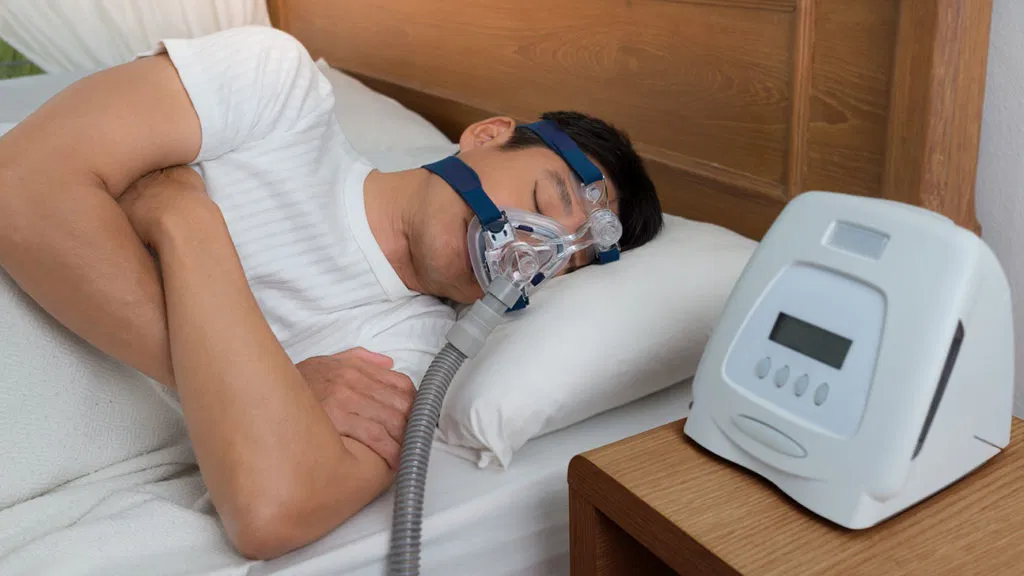This guide is focused on discussing Sleep Apnea, and Treating Sleep Apnea With CPAP.
CPAP therapy is one of the most commonly recommended treatments for obstructive sleep apnea. And a CPAP machine uses a hose connected to a mask or one-piece to deliver consistent and steady air pressure to assist the patient to breathe while sleeping.
Mind you, CPAP are not only recommended to a patient with Sleep Apnea only but there are also other disorders/sickness which can be treated using CPAP.
So in this guide, we will address CPAP description, Sleep Alpean Description and then answer the question of how to treat sleep apnea with CPAP, with other ways sleep apnea could be treated.
Make sure to proceed into the post and find more information if it is Dangerous To Use CPAP Without Sleep Apnea.
Apnea Description
Millions of people around the world are affected by sleep apnea, and it is characterised by repeated pauses in breathing during sleep, which can last from a few seconds to several minutes.
There are different types of sleep apnea disorders and the most common of them is obstructive sleep apnea, which occurs when the muscles in the back of the throat fail to keep the airway open, despite the effort to breathe.
This leads to a reduction in oxygen levels, causing the person to awaken briefly to re-establish breathing. This can occur multiple times throughout the night and can result in disrupted sleep, making it hard for the person to feel well-rested in the morning.
Sleep apnea as said in the word “sleep” is not just linked to sleep alone but has been linked to several serious health problems, including high blood pressure, heart disease, stroke, and memory problems.
Asus, sleep apnea can lead to daytime sleepiness, which can impact work and daily activities. Treatment options for sleep apnea include lifestyle changes, such as losing weight and avoiding alcohol and sedatives, using a continuous positive airway pressure (CPAP) machine, and undergoing surgery.
It is important for individuals who suspect they may have sleep apnea to see a doctor for a proper diagnosis and to discuss the best course of treatment.
What is CPAP?
Continuous Positive Airway Pressure is a machine that uses mild air pressure to the breathing away open while a patient is asleep.
This machine is prescribed for patients with sleep apnea, and also may treat preterm infants who have underdeveloped lungs.
CPAP are very effective and also has its benefits. Equally significant are the long-term advantages of CPAP, which include:
- Helping to prevent or regulate high blood pressure.
- Reducing the risk of stroke
- Boosting memory and other mental function
Despite its benefits, there are some side effects to using a CPAP, which are as follows:
- Congestion
- Runny nose
- Dry mouth
- Nosebleeds.
- And Some masks can irritate.
It is important to note that healthcare providers usually help patients with ways to relieve these symptoms and adjust to using your CPAP machine.
While the most common treatment for Sleep Apnea is the CPAP machine, there are different types as well. These include:
The Bi-level PAP: This machine utilizes two varied pressures, the first during inhalation and the other during exhalation.
The Auto CPAP: This device self-regulates, using a range of pressures to keep airways open.
The Adaptive servo-ventilation (ASV): This machine is reserved for people with central sleep apnea, the machine helps keep the airway open by delivering a required breath when necessary.
Sleep Apnea Symptoms
There are various symptoms of sleep apnea, seeing there is obstructive and central apnea which are similar, with a difference in snoring.
Below are some of the most common symptoms:
- Noisy snoring
- Coughing or choking during sleep
- Halts in breathing
- Inhaling and exhaling through the mouth
- Sleep anxieties
- Bedwetting
- Bad sleeping Postures.
These symptoms are not only obvious at night, though as for children with restless night sleep because of this disorder, daytime symptoms can also be fatigue, falling asleep, and finding it hard to wake up in the morning.
But Infants and young children with sleep apnea have low chances of a snore, especially those with central apnea. Sometimes the only symptom of sleep apnea in this age group is troubled or disturbed sleep.
Treating Sleep Apnea With CPAP
For less complicated issues of sleep apnea, a health care specialist provider may recommend only lifestyle changes, such as losing weight or quitting smoking and may be change the position in which you sleep.
Certain devices can help open a blocked airway. But in other cases, surgery might be necessary.
CPAP:
Although CPAP is the most widespread and credible treatment for treating sleep apnea, some people find it unmanageable or anxious. Some people abandon the CPAP machine. But with practice, most people know to adjust the anxiety of the straps on the mask to obtain a safe and secure fit.
Make sure not to stop using the CPAP machine if you have problems. Verify with your healthcare provider to see what modifications can be made to boost your comfort.
Additionally, reach out to your provider if the symptom persists or begin snoring again despite treatment. If your weight shifts, the pressure settings of the CPAP machine might require to be altered.
Other airway pressure devices:
Suppose using a CPAP machine remains to be a difficulty for you, you might be able to use a different type of airway pressure device that automatically regulates the pressure while sleeping.
Units that supply bilevel positive airway pressure (BPAP) also are accessible. These contribute more pressure when the patients inhale and less when they exhale.
Oral appliances
Patients wear this appliance, to keep their jaw in a forward position, keep the tongue in the right place, and also keep the airway open.
And this appliance is more effective, and productive, which is why patients tend to tolerate it way better than other, so they’re more likely to utilize them at night.
It is important to note that Oral appliances can’t help every person, but they might be a choice for older people who no longer experience facial bone growth.
Several devices are available from dentists. And a patient might desire to try new devices before discovering one that works for him.
Once found, you’ll need to follow up with the dentist frequently during the first year and then constantly after that to make sure that the fit is still good and to reassess the symptoms.
FAQ
Is It Dangerous To Use CPAP Without Sleep Apnea
Now, it is time to answer the question you lot have been waiting for.
An don’t before we jump right into the decision, let’s take a look at the sickness that can be treated using the CPAP machine (excluding Sleep Apnea)
- High blood pressure
- Diabetes,
- Heart Attack
- Stroke
- COPY
And suppose you have any of the sicknesses/disorders listed above then you can use rhe CPAP machine.
Some people might just assume they are affected by Sleep Apnea and go ahead with using a CPAP machine.
Effects Of Untreated Sleep Apnea
Having an untreated Sleep Apnea is a risky move, and this leads to long periods of disturbed sleep, causing chronic daytime fatigue (Especially for children)
This can occur in the child having difficulty paying attention in school. And also they have hyperactivity, causing them to be misdiagnosed with attention deficit hyperactivity disorder (ADHD).
Patients with such untreated disorders face difficulty thriving socially, growth delays, mental delays, heart problems, high blood pressure, high chance of stroke and heart attack in adults.
Conclusion Treating Sleep Apnea With CPAP
Well, according to the guide, there are some other disorders for whereby CPAP can be recommended. And even some who don’t know if they have sleep apnea or not but just assume and go ahead to use CPAP are advised to consult a specialist before doing anything.
And it is important to note that, in every situation don’t assume you should always reach out to a consultant, to be in the safe zone. As said earlier in the post, having untreated sleep apnea can be very dangerous.
So make sure to carefully read through the details in the post to get familiar with important information.
Be sure to shear this guide with friends and family.
Robomin is a freelance writer and blogger who covers topics related to Account Creation, gadgets, Refunds, and how to delete An Account. He has a passion for new and innovative technology and enjoys sharing his knowledge with others

